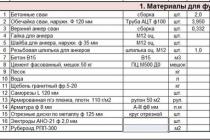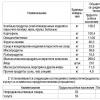Peculiarities health insurance in the Russian Federation (history of formation). Federal, regional Programs state guarantees to provide the population with medical care.
The need for health insurance stems from the main features of the medical services market, one of which is "uncertainty".
For each person, the disease is most often unpredictable, therefore it is impossible to “plan” its onset, and with it the need for financial costs (for medicines, examinations, treatment, for everyday needs in case of disability) is impossible. Moreover, assistance can be very costly and unaffordable if a one-time payment is required. Insurance can counter the financial burden of unpredictable and uncertain costs. At the same time, people, as a rule, are not insured against ill health, but against future financial costs associated with this.
As health insurance purposes can be called:
A guarantee to citizens at the expense of funds accumulated in insurance funds medical care a certain quality when it occurs insured event- diseases, injuries, accidents, etc.;
A guarantee to the manufacturer of medical care to pay for the costs associated with the provision of medical care to insured citizens.
The set goals can be achieved by solving the following complex health insurance tasks :
creation of a system of entities - legal entities legally responsible for the formation of medical and technical conditions to ensure the provision of high-quality medical care to the population;
decentralization of a rigid system health management, granting the right to make decisions to healthcare institutions, ensuring from a legal point of view their activities as independent economic entities;
demonopolization of the state health systems, ensuring participation in the health insurance system of medical service providers, regardless of their form of ownership;
ensuring legal and socio-economic protection of the interests of consumers of medical services using the institution of qualified intermediaries (insurance companies);
strengthening and expanding the use of economic management methods: on the part of the manufacturer - the creation of economic interest in the results of their work, on the part of the consumer - the cultivation of personal responsibility for their health, as well as the creation of conditions for interest in maintaining and strengthening health.
The law "On health insurance of citizens of the RSFSR" was adopted on June 28, 1991, but it turned out to be not entirely efficient, since it did not contain a clear implementation mechanism. Therefore, by the law of April 2, 1993 No. “On Amendments and Additions to the Law of the RSFSR “On Medical Insurance of Citizens in the RSFSR”, amendments were made to the original law of June 28, 1991, which actually marked the beginning of a large-scale development of the medical insurance system.
The law determined two kinds health insurance, each of which has its own principles and financial mechanism for implementation - mandatory and voluntary (comparative analysis is presented in Table 1). According to Art. 1 of the law "On health insurance of citizens in the Russian Federation" compulsory health insurance is an integral part of the state social insurance providing all citizens of the Russian Federation with equal opportunities to receive medical and drug assistance in the amount and on conditions corresponding to the programs of compulsory medical insurance. That is, compulsory medical insurance has a state character, is universal and is a form of social protection of the interests of the population in the preservation and restoration of health in the difficult socio-economic conditions of the country's transition to tough market relations. y Main principles of CHI:
persist positive sides state healthcare system - free medical care (at the time of receipt) within CHI programs, universality and accessibility;
the principles of "social justice" and "social solidarity" are used, when "the rich pay for the poor", "healthy for the sick" (such principles are incorporated into the health insurance systems of most states with a socially oriented economy);
due to the high degree financial risk this species insurance is irrevocable;
the patient's choice of a doctor and health care facilities (within the framework of compulsory medical insurance agreements) essentially implies the abolition of the district-territorial principle of organizing medical care, and the role of primary medical and social care is significantly increasing.
Compulsory health insurance, its subjects
As noted earlier, compulsory health insurance in the Russian Federation is an integral part of state social insurance. The structure of the compulsory medical insurance system includes the following subjects: a citizen (insured person), an insured person, a medical insurance organization (CMO), a medical institution.
Citizen (insured)
Citizens of the Russian Federation in the health insurance system (Article 6 of the Law) have the right to:
compulsory and voluntary health insurance,
choice of QS;
the choice of a medical institution and a doctor in accordance with the contracts of compulsory and voluntary medical insurance;
receiving medical care throughout the Russian Federation, including outside the permanent place of residence;
receiving medical services corresponding in volume and quality terms of the contract, regardless of the amount actually paid insurance premium;
filing a claim against the policyholder, medical insurance organization, medical institution, including for material compensation for damage caused through their fault, regardless of whether it is provided for in the health insurance contract or not;
Repayment of a part of insurance premiums for voluntary medical insurance, if it is determined by the terms of the contract.
Persons without citizenship on the territory of the Russian Federation have the same rights and obligations in the MHI system as citizens of the Russian Federation (Article 7 of the Law). Medical insurance of citizens of the Russian Federation who are abroad, as well as foreign citizens temporarily staying in the Russian Federation, is carried out on the basis of bilateral agreements between the Russian Federation and the countries of residence of citizens, or in the manner established by the Government of the Russian Federation.
Medical insurance is carried out on the basis of contracts concluded between insurance medical organizations and insurers. Each citizen in respect of whom an insurance contract is concluded receives an insurance policy. The insurance policy is in the hands of the insured
The form of an insurance medical policy for CHI is approved by the Government of the Russian Federation.
Insurance medical compulsory medical insurance policy is valid throughout the territory of the Russian Federation, regardless of the place of its issue, as well as in the territories of other states with which the Russian Federation has agreements on medical insurance of citizens.
Policyholder
CHI insurers are:
for the non-working population (children, pupils and full-time students, pensioners, disabled people registered in in due course unemployed) - executive authorities of the respective administrative territory;
for the working population - enterprises, institutions, organizations, self-employed persons and freelancers, i.e. persons of creative professions who are not united in creative unions.
The insured has the right on the(from Article 9 of the Law):
participation in all types of health insurance,
free choice of insurance company,
control over the fulfillment of the terms of the medical insurance contract.
(The insured company has the right to raise funds from the profits for VHI of its employees).
The insured is obliged:
conclude an MHI agreement with an insurance medical organization,
make contributions in order established by law and health insurance contract
within its competence, take measures to eliminate adverse factors affecting the health of citizens.
Subjects of compulsory health insurance are:
1) insured persons;
2) policyholders;
3) federal fund.
Participants of compulsory health insurance are:
1) territorial funds;
2) insurance medical organizations;
3) medical organizations.
The main subjects of CHI are insured persons, policyholders and insurers. CHI applies to the entire population, but depending on the social status of the insured, policyholders also differ. Thus, employers act as insurers of employees. Self-employed citizens are both insured and insured. non-working population the policyholders will be the executive authorities of the constituent entity of the Russian Federation or local government responsible for paying insurance premiums.
In accordance with the law, medical insurance organizations act as an insurer. In addition to the CHI agreement concluded with the insurers, they must conclude agreements with medical institutions on the provision of medical services to the insured contingent and ensure the realization of the rights of citizens to medical care in CHI system. Insurance companies are commercial organizations any organizational and legal form. In accordance with the Regulations on them, approved by the Decree of the Council of Ministers of the Government of the Russian Federation of October 11, 1993, they are obliged to carry out CHI activities on a non-commercial basis.
Funds received from the Compulsory Medical Insurance Fund are used to pay for medical services, for the costs of doing business under compulsory medical insurance, the formation of reserves and the remuneration of employees. The income of the insurance organization is formed by the funds saved on the conduct of the CHI case. It turns out that insurance organization, whose main task is to control the volume and quality of medical services, is directly interested in the fact that these services are of poor quality, which gives it the right to refuse payment for services or reduce it.
At the same time, it should be emphasized that the insurance organization, being a commercial one, manages the funds of compulsory medical insurance. There is a commercialization of state functions. This is contrary to Art. 6 federal law on the basics of compulsory social insurance, which stipulates that in this system only non-profit organizations.
It is no coincidence that in many subjects Russian Federation abandoned the insurance model CHI organizations in which only medical insurance organizations are insurers. Thus, many subjects of the Federation use mixed model where the insurers are both insurance organizations and CHI funds. In 16 regions, the "stock" model is used, funds act as insurers, and insurance organizations are involved only in the system of voluntary medical insurance. A "conditional" or "zero" model of CHI existed in 1995 in 18 subjects of the Federation. The funds collected by the funds were transferred to the health authorities.
Experts consider the second, mixed model to be the most effective, in which 98.6% of the CHI funds reached the service provider. Funds CHI functions the insurer were provided for transition period, but, as can be seen from the above data, they are interested in maintaining their powers and expanding them. In most countries that use the insurance model of healthcare organization, compulsory medical insurance is carried out by state or quasi-state structures, like our funds.
If we literally follow the Federal Law on the Fundamentals of Compulsory Social Insurance (Articles 6, 11, 21, etc.), funds act as insurers in the CHI system.
Firstly, only non-profit organizations can act as insurers, which include non-budgetary social funds, including CHI funds. Secondly, it is the competence of the foundations to form insurance fund, collection of insurance payments for the non-working population, registration of policyholders and keeping their records, etc. Only such authority of the insurer as the timely payment of insurance coverage belongs to the jurisdiction of insurance organizations.
More precisely, in the compulsory medical insurance system, insurance organizations pay for the services provided to insured persons by medical institutions, therefore it is more correct to say that insurance coverage in kind is provided by medical institutions in accordance with the contracts that insurance organizations have concluded with them.
There is a situation in the CHI system when the powers of the insurer are distributed among funds and insurance organizations, a kind of “dualism of the insurer”, and the functions of directly providing security are performed by medical institutions.
The insurance medical organization carries out the following:
Makes payments and pays for medical services of medical institutions,
Implements direct control over the volume and quality medical care,
protect the rights and interests of its clients,
Provides issuance and accounting of insurance policies
The relationship between the insured and the insurance medical organization is realized through insurance premiums. For compulsory health insurance, they are set as payment rates in amounts that cover the costs of implementing compulsory medical insurance programs and ensure the profitable operation of HMOs.
Medical institutions in the health insurance system are licensed medical and preventive institutions, research and medical institutes, other institutions providing medical care, as well as persons engaged in medical activities, both individually and collectively.
Compulsory health insurance is based on a system of contracts between the subjects of insurance, reflecting the rights, obligations and responsibilities of the parties. The patient gets the opportunity to choose an independent advocate for their interests when receiving medical care.
Each insured person or policyholder, in accordance with the procedure established by the compulsory medical insurance agreement, is issued by an insurance medical organization with an insurance medical policy compulsory health insurance. On the territory of the Russian Federation, there is an insurance policy of compulsory medical insurance of a single sample.
The object of medical insurance is the insured risk associated with the costs of providing medical and diagnostic services in the event of an insured event.
Medical institutions
Medical care in the system of compulsory health insurance can be provided by medical institutions any form of ownership with the appropriate licenses. Medical institutions, research and medical institutions, other institutions providing medical care, as well as persons engaged in medical activities, both individually and collectively, and having licenses for this type of activity, are medical institutions in the health insurance system.
Relations between a medical institution and an insurance medical organization are built on the basis of a contract for the provision of medical and preventive care (medical services).
Medical institutions, along with insurers, are responsible for the volume and quality of medical services provided, for the refusal to provide medical care to the insured party. In case of violation by the medical institution of the terms of the contract, the insurance medical organization has the right to partially or completely not reimburse the costs of providing medical services.
The health insurance contract, which is concluded between the insured and the insurer, must indicate:
name of the parties;
the duration of the contract;
the number of insured persons;
the amount, terms and procedure for making insurance premiums;
· list of medical services corresponding to programs of obligatory or voluntary medical insurance;
· rights, obligations, liability of the parties and other conditions that do not contradict the legislation of the Russian Federation.
The health insurance contract is considered concluded from the moment of payment first insurance premium unless otherwise provided by the terms of the contract.
1. In contrast to the previous legislation, the commented article distinguishes between the circle of "subjects of compulsory medical insurance" and "participants of compulsory medical insurance".
In the earlier acting Law of the Russian Federation of June 28, 1991 N 1499-1, "a citizen, an insurer, an insurance medical organization, a medical institution" were called as subjects of medical insurance (Article 2). It was assumed that the subjects are simultaneously participants in compulsory health insurance. Both subjects and participants of compulsory health insurance participate in the relationship of compulsory health insurance and at the same time have their own specific role and their own terms of reference.
The main direct actors of CHI are the subjects. Perhaps, main difference subjects from participants is that legal status subjects are strictly defined by law and their composition is mandatory.
The presence of an insurer, a policyholder and an insured person is a "classic" model of any compulsory insurance.
Between CHI participants contracts for financial support Compulsory medical insurance and contracts for the provision and payment of medical care under compulsory medical insurance.
In particular, to insured persons classified as working and non-working citizens of the Russian Federation.
It has been established that foreign citizens and stateless persons permanently or temporarily residing in Russia have the same rights and obligations in the MHI system as citizens of the Russian Federation.
Members may be legal entities, created and operating on the basis of the current legislation and performing "auxiliary" functions within the framework of the CHI.
single insurer named in the CHI system Federal CHI Fund(clause 3 of part 1 of the commented article).
Separate powers of the insurer are exercised by territorial CHI funds and insurance medical organizations that have the status of participants.
Policyholders with OMS are:
- for the non-working population- executive authorities of the constituent entities of the Russian Federation;
- for the working population employers, which include
organizations,
Individuals registered as individual entrepreneurs,
Notaries in private practice
Lawyers
Individuals who have entered into employment contracts with employees, as well as paying remuneration under civil law contracts, on which, in accordance with the legislation of the Russian Federation, taxes are charged in the part to be credited to the compulsory medical insurance funds.
Medical organizations are also full participants in the CHI system.
Medical institutions include:
Medical institutions, research institutes, medical institutes, other institutions providing medical care;
Subjects of compulsory health insurance are:
insured persons;
Insurers;
Federal fund.
Participants of compulsory health insurance are:
Territorial funds;
Insurance medical organizations;
Medical organizations.
According to Article 9 of the Federal Law "On Compulsory Medical Insurance in the Russian Federation", insured persons are citizens of the Russian Federation permanently or temporarily residing in the territory of the Russian Federation, foreign citizens, stateless persons (with the exception of highly qualified specialists and members of their families), as well as persons entitled to for medical care in accordance with the Federal Law “On Refugees” (working under an employment contract, self-employed, members of farms, non-working citizens).
The insurers for working citizens are:
Organizations;
Individual entrepreneurs;
Individuals who do not recognize themselves as individual entrepreneurs;
Persons making payments and other remuneration to individuals;
Individual entrepreneurs engaged in private practice (lawyers, notaries)
The insured for non-working citizens are the executive authorities of the subjects of the Russian Federation, authorized by the highest executive body of state power of the subjects of the Russian Federation. These insurers are payers of insurance premiums for compulsory medical insurance of the non-working population.
The Federal Compulsory Medical Insurance Fund (FFOMS) is an independent non-profit institution that operates in accordance with the provisions of the Constitution of the Russian Federation, federal laws, decrees and orders of the President of the Russian Federation, decrees and orders of the Government of the Russian Federation, as well as the Charter of the Fund 10 .
The main tasks of the FFOMS are:
financial support of the rights of citizens to medical care established by Russian legislation at the expense of compulsory medical insurance;
security financial stability CHI systems and creation of conditions for equalizing the volume and improving the quality of medical care provided to citizens throughout the country within the framework of the basic program of compulsory medical insurance;
storage financial resources FFOMS to ensure the financial stability of the compulsory health insurance system.
The financial resources of the FFOMS are formed from the following receipts:
unified social tax economic entities and other organizations on CHI in the amount in accordance with part two of the Tax Code of the Russian Federation,
appropriations from federal budget for the implementation of federal target programs within the framework of compulsory medical insurance:
voluntary contributions of legal entities and individuals
income from the use of temporarily free financial resources
income from other sources not prohibited by law,
normalized insurance stock FFOMS.
Territorial funds are non-profit organizations created by the constituent entities of the Russian Federation to implement state policy in the field of compulsory medical insurance in the territory of the constituent entities of the Russian Federation.
Currently, the implementation of state policy in the field of compulsory medical insurance, in addition to the Federal Fund for Compulsory Medical Insurance, is carried out by 86 territorial compulsory medical insurance funds, of which 2 are established in the Crimean Federal District.
An insurance medical organization is an insurance organization that has a license issued by the federal executive body that exercises the function of control and supervision in the field of insurance activities.
Medical organizations in the field of compulsory health insurance include those having the right to carry out medical activities and included in the register of medical organizations operating in the field of compulsory health insurance:
Any organization provided by law RF organizational and legal form;
Individual entrepreneurs engaged in private medical care.
The number of persons insured under compulsory health insurance as of April 1, 2015 amounted to 143.8 million people; including 60 million employed and 83.8 million non-working citizens. eleven
The object of compulsory health insurance is the insured risk, which is associated with the occurrence of an insured event.
An insured risk is an anticipated event, upon the occurrence of which it becomes necessary to incur the costs of paying for the medical care provided to the insured person 12 .
An event considered as an insured risk must have a sign of probability and randomness of its occurrence. The likelihood of illness or injury in a person is due to the fact that all living beings are subject to physical damage or disease.
The accidental occurrence of an event, upon the occurrence of which it becomes necessary for the insured person to pay for the medical care provided to the insured person, is due to the fact that such events arise all depending on the will, consciousness and actions of people.
An insured event is an event that has occurred, upon the occurrence of which the insured person is provided with insurance coverage for compulsory health insurance 13 .
In an insured event, risk events are the “starting point” for the emergence of legal relations for compulsory health insurance, and ultimately for the provision of insurance coverage to the insured person. The events that have occurred are subject to consideration as legal facts.
Insurance coverage for compulsory medical insurance is carried out upon the occurrence of an insured event. The provision, in itself, consists in the use of a number of obligations to provide the insured person in need with the necessary medical care.
1 Fundamentals of insurance activities: Textbook / Ed. ed. prof. T.A. Fedorov. - M .: Publishing house BEK, 2002.
2 of the Federal Law of November 29, 2010 No. 326-FZ “On Compulsory Medical Insurance in the Russian Federation” (as amended on January 1, 2015) URL: http://base.consultant.ru/cons/cgi/online.cgi?req=doc; base=LAW;n=171752
3 "Compulsory health insurance in the Russian Federation" // Scientific and practical journal. - 2013 - No. 6. - 22 p.
4 The Constitution of the Russian Federation // Collection of Legislation of the Russian Federation, 04.08.2014, N 31, Art. 4398.
5 Order of the Ministry of Health of Russia N 158n “On Approval of the Rules for Compulsory Medical Insurance” dated February 28, 2011 (as amended on August 6, 2015) URL: http://base.consultant.ru/cons/cgi/online.cgi?SEARCHPLUS=Ob %approval%20legal%20compulsory%20medical%20insurance&SRD=true&red=home#doc/LAW/187123/4294967296/0
6 of the Federal Law of November 29, 2010 No. 326-FZ “On Compulsory Medical Insurance in the Russian Federation” (as amended on January 1, 2015) URL: http://base.consultant.ru/cons/cgi/online.cgi?req=doc; base=LAW;n=171752
7 Decree of the Supreme Council of the RSFSR N 1920-1 "On the Declaration of the Rights and Freedoms of Man and Citizen" art. 25 // "Vedomosti SND of the RSFSR and the Supreme Council of the RSFSR" - 12/26/1991
8 MFOMS website URL: http://www.mgfoms.ru/sistema-oms/polis/
9 Andreeva E.N. "Features of the implementation and development of CHI" / V.A. Lind, V.V. Petukhova. - Medical insurance No. 2, - M .: 2005 - 89s.
10 FFOMS website URL: http://ora.ffoms.ru/portal/page/portal/top/about/general/
11 FFOMS website URL: http://ora.ffoms.ru/portal/page/portal/top/about/
What is the OMS system? How do they interact with it? individuals, insurers and FFOMS? What makes it possible to count on the provision of medical care free of charge? We will consider these and other questions in more detail.
What is OMS?
Compulsory medical insurance (hereinafter referred to as CHI) is a type of compulsory insurance that determines the possibility of providing free medical care to the insured person in the prescribed volumes and cases.
Who according to the current legislation is the insured person?
These are individuals who are insured under compulsory medical insurance. Insured persons can be classified into two groups - working and non-working citizens.
The group of "working citizens" includes:
- employed persons (who are in labor relations with organizations or have entered into a civil law contract);
- self-employed population individual entrepreneurs, notaries, lawyers);
- members of peasant (farm) households;
- members of family (tribal) communities of indigenous peoples of the North, Siberia and Far East Russian Federation, living in the regions of the North, Siberia and the Far East, engaged in traditional industries.
The group of "non-working citizens" includes:
- children (under the age of 18);
- non-working pensioners;
- students, full-time education, in higher and secondary professional educational institutions;
- officially registered unemployed citizens;
- persons engaged in caring for a child under the age of 3 years, and citizens engaged in caring for children with disabilities, disabled people of group I, persons who have reached the age of 80 years.
What are the insured entitled to expect? CHI persons?
First of all, the main possibility of compulsory medical insurance is the free provision of medical care throughout Russia (within the framework of the basic compulsory medical insurance program). Also, citizens have the right to choose an insurance medical organization.
What are the obligations for the insured persons?
In accordance with the current legislation, citizens subject to compulsory health insurance must:
- submit a compulsory medical insurance policy when applying for medical assistance;
- submit an application to the insurance organization for the choice of this organization;
- notify the insurance medical organization of any change in personal data (last name, first name, patronymic, place of residence) within one month from the date of these changes;
- make a choice of an insurance medical organization when changing the place of residence;
Who is a CHI insurer?
According to Article 11 of the Federal Law No. 326-FZ, the insurers are:
- Persons making payments and other remuneration to individuals:
- organizations;
- individual entrepreneurs;
- individuals who are not recognized as individual entrepreneurs; - Individual entrepreneurs engaged in private practice, notaries, lawyers.
We note that the insurers for non-working citizens are the executive authorities of the constituent entities of Russia and other organizations determined by the Government.
Insurer for compulsory health insurance is the Federal Compulsory Medical Insurance Fund(FFOMS) and its territorial bodies(TFOMS).
One of the main participants in the compulsory medical insurance system is a medical insurance organization - an insurance organization that has an appropriate license in the field of insurance activities and which exercises certain powers of the insurer. Also, medical institutions of all organizational and legal forms (state, municipal and private) participate in the CHI system.














